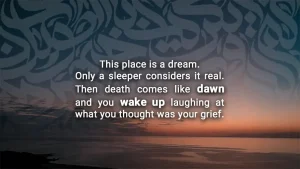Rumi, also known as Jalal ad-Din Muhammad Balkhi, was a 13th-century Persian poet, Islamic scholar, and Sufi mystic. His works have transcended time and geographical boundaries, captivating readers with their depth of emotion and spiritual insight. Rumi’s poetry, characterized by its profound wisdom and universal appeal, inspires and resonates with people worldwide. In this article we’ll explore poem and quotes about death by Rumi.
Understanding Death in Rumi’s Poetry
In Rumi’s poetry, death is not merely the end of physical existence but a transformative journey towards spiritual enlightenment. He often employs death as a metaphor to explore life’s temporary nature and the soul’s transcendence beyond the material realm. Rumi’s perspective on death reflects his belief in the physical body’s impermanence and the soul’s eternal nature.
Poem and Quotes About Death by Rumi
Poems and quotes about death by Rumi are poignant reflections on the human experience and the inevitability of mortality. One such quote is, “Die before death and find that there is no death.” This profound statement encourages individuals to transcend their fear of death by embracing spiritual awakening and inner transformation.
Another notable quote by Rumi is, “The moment you accept what troubles you’ve been given, the door will open.” This quote emphasizes the importance of surrendering to the natural cycle of life and death, leading to a deeper understanding of existence.
Poems About Death by Rumi
Rumi’s poems on death are imbued with deep emotion and spiritual insight, offering solace and guidance to those grappling with the mysteries of mortality. In his poem “The Death of the Ego,” Rumi explores the transformative power of letting go of the egoic self and embracing the divine essence within. Through vivid imagery and profound symbolism, Rumi invites readers to confront their fear of death and embrace the eternal truth of their existence.
The Concept of Death in Sufism
Sufism, the mystical branch of Islam, shares Rumi’s belief in the metaphysical nature of death and the soul’s journey toward union with the divine. In Sufi teachings, death is not the end but a gateway to the eternal realm of the spirit. Sufi mystics like Rumi view death as a sacred passage that leads to spiritual liberation and reunion with the Beloved.
Impact of Rumi’s Perspective on Death
Rumi’s profound insights on death continue to inspire seekers of truth and wisdom across cultures and generations. His timeless teachings offer a profound perspective on the human experience, encouraging individuals to embrace the inevitability of death as an opportunity for spiritual growth and awakening. Rumi’s poetry is a beacon of hope and enlightenment, guiding souls toward inner peace and fulfillment in an age of uncertainty and existential angst.
Comparative Analysis: Rumi’s View on Death vs. Western Perspectives
Rumi’s perspective on death stands in stark contrast to many Western philosophical views, which often view death as the ultimate end of existence. While Western thought tends to emphasize the finality of death, Rumi’s teachings highlight the eternal nature of the soul and the possibility of transcending physical limitations.
This comparative analysis offers valuable insights into the diverse ways in which cultures perceive and understand mortality.
The Role of Death in Rumi’s Quest for Divine Love
In Rumi’s poetry, death is intimately intertwined with the theme of divine love. He views death not as an obstacle but as a catalyst for spiritual awakening and union with the Beloved. Rumi’s quest for divine love is intricately linked to his acceptance of mortality and willingness to surrender to the divine will.
Through his exploration of death and love, Rumi invites readers to transcend their earthly attachments and embrace the eternal truth of their existence.
Rumi’s Reflections on Mortality and Impermanence
Rumi’s meditations on the fleeting nature of life resonate deeply with readers, reminding them of the impermanence of worldly existence. He encourages individuals to embrace the transience of life and find meaning in the face of mortality. Rumi’s poetry serves as a reminder to cherish each moment and live fully in the present, knowing that death is but a doorway to the eternal realm of the spirit.
The Eternal Soul: Rumi’s Vision Beyond Death
Rumi’s portrayal of the soul transcending death reflects his belief in the eternal nature of the human spirit. He views death not as the end but as a transition to a higher state of consciousness. Rumi’s vision of the eternal soul offers solace to those grappling with the fear of death, reminding them that their essence is everlasting and immutable.
Death as a Catalyst for Spiritual Awakening in Rumi’s Poetry
Encounters with mortality serve as transformative experiences in Rumi’s poetry, inspiring individuals to awaken to the deeper truths of existence. Through his vivid imagery and profound insights, Rumi invites readers to confront their mortality and embrace the fullness of life. In Rumi’s view, death is not to be feared but embraced as a gateway to spiritual liberation and enlightenment.
The Symbolism of Death in Rumi’s Ecstatic Poetry
In Rumi’s ecstatic verses, death is often portrayed as a metaphor for the dissolution of the ego and the merging of the individual soul with the universal consciousness. Through ecstatic experiences, Rumi invites readers to transcend their limited sense of self and experience union with the divine. In this context, death symbolizes the ultimate liberation from the constraints of the ego and the realization of one’s true identity.
Rumi’s Message of Hope and Resilience in the Face of Death
Despite the inevitability of death, Rumi’s poetry exudes a message of hope and resilience, encouraging readers to find meaning and purpose amidst the impermanence of life. His teachings offer comfort and solace to those grappling with the mysteries of mortality, reminding them that death is but a doorway to the eternal realm of the spirit.
Rumi inspires individuals to embrace life fully and the eternal truth of their existence through his timeless wisdom and profound insights.
Exploring Rumi’s Legacy: Death as a Gateway to Immortality
Rumi’s poetry continues to transcend time and mortality, offering solace and inspiration to countless souls. His teachings on death and spirituality resonate with seekers of truth and wisdom, inviting them to embark on self-discovery and enlightenment.
Rumi’s legacy endures as a testament to the enduring power of poetry to illuminate the human experience and awaken the soul to its divine potential.
Why Danaa School?
Danaa School is committed to preserving and promoting the rich cultural heritage of Persian poety, including the timeless poems of Rumi. With a curriculum designed to inspire and educate, Danaa School allows students to explore the world of Persian poetry and discover the profound wisdom and beauty contained within.
Through engaging lessons, interactive activities, and immersive experiences, Danaa School students learn about Persian poetry, the legendary Persian poets and develop a deeper appreciation for the cultural heritage that continues to shape their identity and worldview.
Find Your Perfect Teacher
At Danaa School, you can find your Persian Poetry Tutor from all qualified and experienced teachers.
Now experience the excellent language and poetry journey.

FAQs
Is Rumi's poetry religious?
Rumi’s poetry is deeply rooted in Islamic spirituality and mysticism. Still, its love, unity, and transcendence themes resonate with people of all faiths and backgrounds.
What is the significance of death in Rumi's work?
Death in Rumi’s poetry symbolizes the impermanence of physical existence and the soul’s journey toward spiritual enlightenment.
How can Rumi's perspective on death help individuals cope with loss?
Rumi’s teachings offer comfort and guidance to those grappling with the inevitability of death, encouraging them to embrace the eternal truth of their existence.
Are there any modern interpretations of Rumi's poetry on death?
Many scholars and poets continue to explore and interpret Rumi’s insights on death in contemporary contexts, highlighting the relevance of his teachings in today’s world.
Where can I find more of Rumi's poetry on death?
Rumi’s collections, such as the “Divan-e Shams-e Tabrizi” and the “Masnavi,” contain numerous poems that explore the theme of death and spiritual transformation.
How does Rumi's poetry approach the topic of death differently from other poets?
Rumi’s poetry offers a unique perspective on death, viewing it as a transformative journey rather than a finality. Unlike many poets who dwell on the sorrow of mortality, Rumi celebrates death as a gateway to spiritual awakening and union with the divine.
Are there any specific rituals or practices in Sufism related to death?
Sufism encompasses various rituals and practices related to death, including recitation of sacred texts, prayers for the departed, and commemorative gatherings known as dhikr. These practices honor the deceased and facilitate their soul’s journey towards the afterlife.
Conclusion
In conclusion, Rumi’s profound insights on death offer valuable lessons for navigating the complexities of human existence. His poetry invites readers to confront their mortality with courage and grace, knowing that death is but a doorway to the eternal realm of the spirit.
Are you fascinated by the Persian literature? Do you want to explore the world of Rumi and the beauty hidden within their works? Look no further than Danaa School’s Poetry classes! Enroll now.
Want to Learn Persian Poetry at Danaa School?
Here are the best resources for you!










